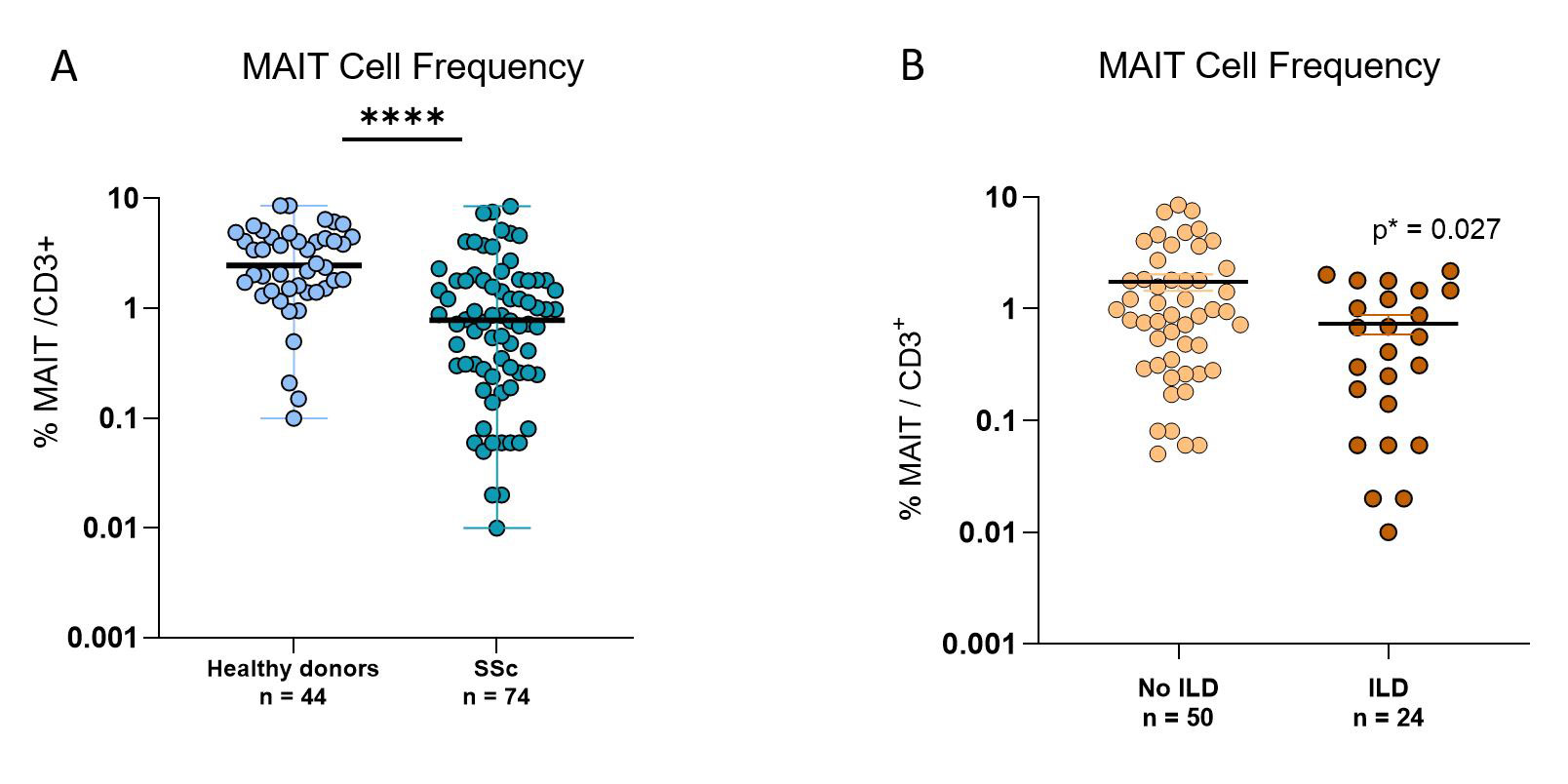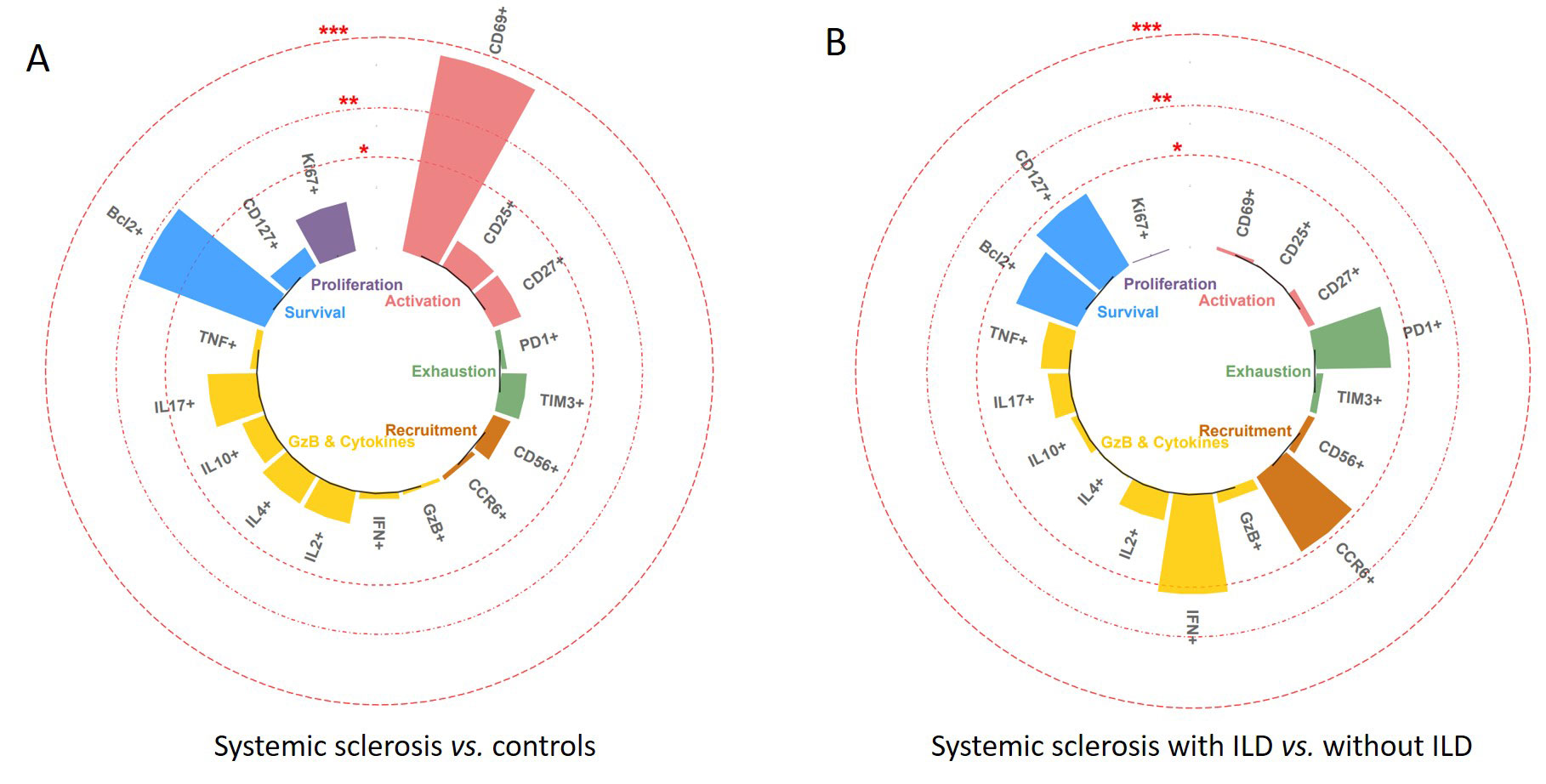Session Information
Date: Sunday, November 13, 2022
Title: Systemic Sclerosis and Related Disorders – Basic Science Poster
Session Type: Poster Session C
Session Time: 1:00PM-3:00PM
Background/Purpose: Systemic sclerosis (SSc) is an autoimmune disease characterized by fibrosis of the skin and internal organs such as the lung. Mucosal-associated invariant T (MAIT) cells are innate-like T lymphocytes able to produce various cytokines and cytotoxic mediators such as granzyme B. Decreased level and altered phenotype of MAIT cell have been shown in various autoimmune disease. Moreover, some data support a potential role in fibrotic disorders as highlighted in liver fibrosis. Therefore, we herein addressed the question as whether MAIT cells may have an altered profile in systemic sclerosis.
Our objective was to determine the implication of MAIT cells in SSc.
Methods: MAIT cell frequency was analyzed by flow cytometry, using fresh peripheral blood from 74 consecutive SSc patients compared to 44 healthy donors. In addition, in depth MAIT cell phenotype and function were analyzed using fresh peripheral blood from 29 women with SSc compared to 23 healthy women donors.
Results: Most of the healthy donors were female (95%) and the mean age was 45.6 years. Among the 74 SSc patients (89% were female, mean age: 57 years), the mean disease duration was 9 years, 42% had diffuse cutaneous SSc and 48% had an interstitial lung disease (ILD). Proportion of circulating MAIT cell frequency was significantly reduced by 55% in SSc compared to healthy donors (1.4 % vs. 3.1%, p< 0.0001) (Figure 1A). We next investigated whether MAIT cell frequency was associated with clinical variables in SSc patients. MAIT cell frequency was significantly reduced in patients with interstitial lung disease (SSc-ILD) (0.49% vs. 0.91% in patients without ILD, p=0.027) (Figure 1B) even lower in the patients with severe ILD and reduced forced vital capacity (FVC) (0.25% in patients with FVC < 75% vs. 0.94% in patients with FVC >75%). Deficiency of MAIT cells did not correlate with disease activity score, type of SSc (diffuse or limited), systemic inflammation, and current immunosuppressive therapy.
In SSc patients, MAIT cells displayed a strongly activated phenotype indicated by markedly increased CD69+ MAIT cell frequency compared to healthy donors (p=0.0015, Figure 2A). Decreased proportion of MAIT expressing the anti-apoptotic marker Bcl2 was also observed. Regarding the cytokine profile analysis, no difference was observed compared to healthy controls (Figure 2A). Interestingly, MAIT cells from SSc-ILD patients had a more pronounced altered phenotype compared to SSc without ILD, with a correlation between MAIT expressing CCR6+ and MAIT frequency and a decreased production of IFN-γ (Figure 2B).
Conclusion: Circulating MAIT cells were reduced and exhibited an activated and pro-apoptotic phenotype in SSc patients compared to healthy controls. This peripheral MAIT cell deficiency may be related to enhanced apoptosis and/or homing in inflamed tissue, in particular the lung in SSc-ILD patients. Indeed, peripheral MAIT decrease was even more pronounced in SSc-ILD patients, and correlated with the expression of the tissue-recruitment chemokine CCR6. MAIT cells study in lung tissue as well as functional studies are necessary to better understand the implication of MAIT cells in systemic sclerosis.
Test: Mann-Whitney. * p ≤ 0, 05, ** p ≤ 0, 01, *** p ≤ 0, 001. SSc: Systemic Sclerosis. ILD: Interstitial Lung Disease . Bcl: B-cell lymphoma. CD: Cluster de Différentiation. CCR: C-C Motif Chemokine Receptor. IFN: Interferon. IL: Interleukine. GzB: Granzyme B. PD1: Programmed cell Death protein 1. TNF: Tumor Necrosis Factor.
To cite this abstract in AMA style:
Lesturgie-Talarek M, Gonzalez V, Frantz C, Sénot N, Gouda Z, Rousseau C, Beaudoin L, Lehuen A, Avouac J, Allanore Y. Deficiency and Altered Phenotype of Mucosal-associated Invariant T Cells in Systemic Sclerosis [abstract]. Arthritis Rheumatol. 2022; 74 (suppl 9). https://acrabstracts.org/abstract/deficiency-and-altered-phenotype-of-mucosal-associated-invariant-t-cells-in-systemic-sclerosis/. Accessed .« Back to ACR Convergence 2022
ACR Meeting Abstracts - https://acrabstracts.org/abstract/deficiency-and-altered-phenotype-of-mucosal-associated-invariant-t-cells-in-systemic-sclerosis/


